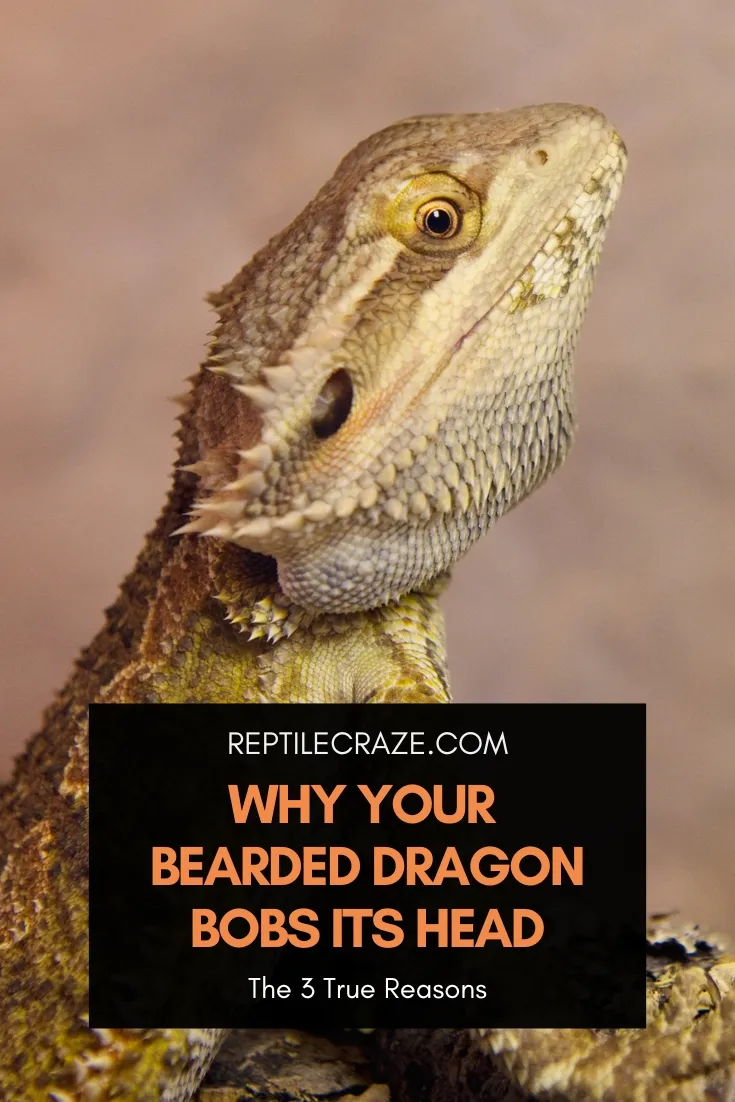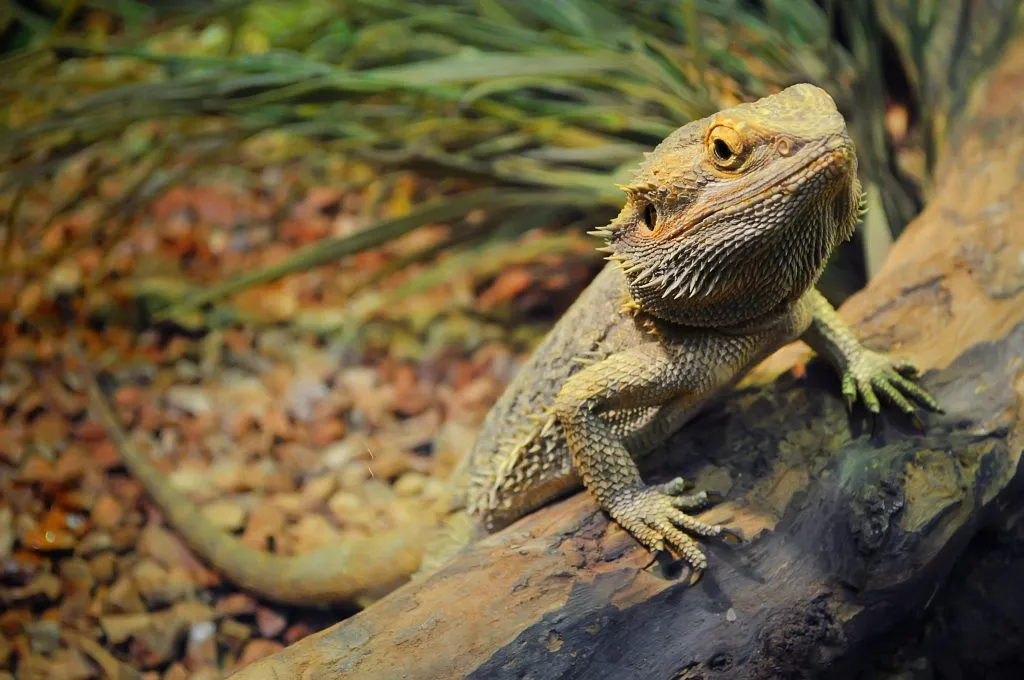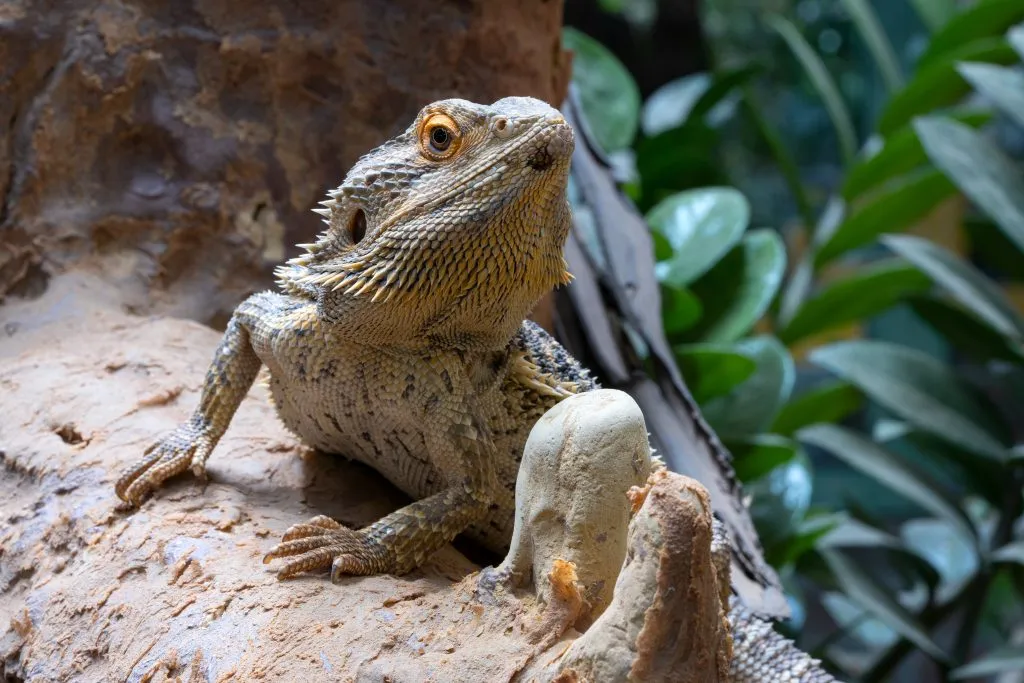
Bearded dragons are known for their cute head bobs. But is the head bobbing of bearded dragons normal? Do bearded dragons bob their heads when they feel uncomfortable? These head bobs can be subtle so you really have to pay close attention to the body language of your beardie to understand it.
Bearded dragons bob their heads when there is something in their environment that makes them feel uneasy. It can be due to them being territorial, reaction to potential mates or other animals, or even just curiosity. Generally, head bobbing in bearded dragons is considered a natural behavior.
In this article, we will talk about why your bearded dragon is head bobbing. We will also discuss when it is a cause for concern. So keep reading to find out the meaning behind those cute head bobs!
Table of Contents
Reasons Why Your Bearded Dragon Is Head Bobbing
Before finding out the reason for the head bobs, it is essential to discern what is a head bob compared to other bearded dragon body language.
Head bobbing in bearded dragons is characterized by up and down motions of only the head. Usually, your beardie is focused on something when it bobs its head.
On the other hand, it can be easily mistaken as head bobbing when it is actually shaking its body. The body shaking, may also lead your beardie to move its head up and down.
You can look at this article to determine whether your beardie is head bobbing or body shaking.
1. Your Bearded Dragon Is Being Territorial
Bearded dragons are territorial reptiles. It does not matter whether we are talking about captivity or in the wild. They will try to defend their space against other animals or beardies or even you.
Bearded dragons bob their heads as a show of dominance over their domain when they feel threatened by a foreign presence.
It does not have to be a living thing as they may bob their heads toward inanimate things like new decorations inside the enclosure or even a new water bowl.
Even if your bearded dragon is tame and socialized through handling training, it may still bob its head when it feels the need to defend its territory.
Your Bearded Dragon Is Acknowledging Other Animals
When bearded dragons bob their heads in response to their instinct to be territorial, it does not necessarily lead to a fight. They can also bob their heads as a way of acknowledging other animals in the area.
If you have other pets in your home and that certain pet approaches the enclosure of your bearded dragon, you will notice that your beardie may go out of hiding or leave its basking spot in order to check out your other pet.
It may go near the glass and do head bobs as it observes the actions of your cat or dog. It may continue to do so until your other pet leaves the room.
The same goes if your beardie’s enclosure is near the windows and it can see birds or other animals outside.
As harmless as this may seem, this can be damaging to your beardie as even though it does not intend to fight the other animals, it still feels stressed while that other animal is in the area.
Constant stress can weaken the immune system of your beardie.
A good thing to do if you have other pets in your home is to not let them inside the room where your bearded dragon is.
If this is unavoidable, you can cover a part of the
The Bearded Dragon Is Intimidating Other Bearded Dragons
Bearded dragons tend to choose the flight response when interacting with other animals, however, if they do encounter other bearded dragons, they will try to show dominance by head bobbing.
When provoked, they can even nip or fight the other beardie into submission.
Usually, if you expose two male bearded dragons to each other, their initial response is to head bob as a way of intimidating one another.
In such a case where one beardie does not submit (does not wave its arms in submission) the other beardie may charge against it and continue to head bob.
2. It Is A Bearded Dragon Mating Response
Bearded dragons also bob their heads when they have the desire to mate. Male bearded dragons bob their heads to show female beardies that they are ready and capable to be a mate.
On the other hand, female bearded dragons also bob their heads but they do so in a slower and more subtle way to show that they are willing to mate with the male beardie.
It is also possible that the female refuses to submit to the male in which case, they bob their head and also keeps it raised.
If you are trying to breed bearded dragons and notice that one or both of them are shaking their heads instead of head bobbing, this article will help you understand the behavior.
3. The Bearded Dragon Is Showing Interest
We have established that head bobbing in bearded dragons is a natural response. Therefore, they can also head bob when there is a stimulus that they find interesting in their environment.
You may ask, “Why is my bearded dragon bobbing at nothing?” You may think that it is nothing but you simply cannot see that “something” that your beardie is curious about.
If something catches their attention, no matter how big or small, they can bob their heads.
This is why some beardie owners notice that their beardies bob their heads when it is time to eat. This can be construed as their excitement to feed.
Some bearded dragons also bob their heads when they are petted which could mean that they are enjoying the petting sensation.
There are still no studies on whether bearded dragons love their owners and thus head bob due to petting, but it is undeniable that many beardies ask their owners for attention for the purpose of cuddling or petting.
So head bobbing while doing so can be viewed as a positive response.
Why Is My Bearded Dragon Head Bobbing With A Black Beard?
When you see your bearded dragon’s head bobbing rapidly and its beard started to turn dark, it means that it feels threatened or is under immense stress.
This can be a sign of an impending fight with another bearded dragon or a sign to bite your hand while it is inside the enclosure (if your beardie is still not tamed)
If you just got your bearded dragon and it is still not used to your presence and you try to hand feed it, your beardie might think that your hand is a threat.
Therefore, it will bob its head and its beard will turn black, waiting for the right moment to bite your hand.
Tip: Are you sure that your bearded dragon likes you? In this article, we explain the signs that show that your beardie likes you.
Why Is My Bearded Dragon Head Bobbing In Its Sleep?

You may think that your bearded dragon is having an amazing dream when it bobs its head during its sleep. However, this means that it is drifting in and out of its sleep.
This may be a cause for concern when it happens often because it will affect the sleep cycle of your beardie.
If your beardie does not get enough sleep, it will be lethargic during the day and may even refuse food. This of course leads to other serious health issues. Your bearded dragon’s sleep may be interrupted by the following:
- Lights in the enclosure are left on during the night. Lights in the room may also be left on causing the inability of your bearded dragon to sleep.
- There is a sudden temperature drop in the enclosure, thus underheating the
tank at night. - Noises around the enclosure.
- Live feeders are left in the enclosure.
Always be on the lookout if your beardie head bobs during its sleep. It is the biggest sign that it is not getting quality sleep.
Why Is My Bearded Dragon Head Bobbing And Stomping?

The head bobbing of bearded dragons is usually paired with stomping when they are trying to establish dominance. This is usually seen when you expose your beardie to another beardie, may it be male or female.
At the same time, when you have a bearded dragon that is yet to undergo handling training, it may assert its dominance over you (in this case your hand) when you try to get it from its enclosure.
You have to be careful when this happens as it is likely that it will try to bite you.
Final Thoughts
There is no need to worry when your bearded dragon is bobbing its head. It is a natural response to things that are happening around them.
However, if the head bobbing becomes intense, then this means that your beardie is under a lot of stress which can be harmful to its health. Assess the situation and immediately remove or adjust the root of their stress.
- Enchi Ball Python: A Unique and Stunning Morph of Python regius - March 27, 2025
- Emerald Tree Monitor: The Enigmatic Green Guardian of the Rainforest - March 26, 2025
- The Egyptian Cobra (Naja haje): A Fascinating Serpent - March 25, 2025
